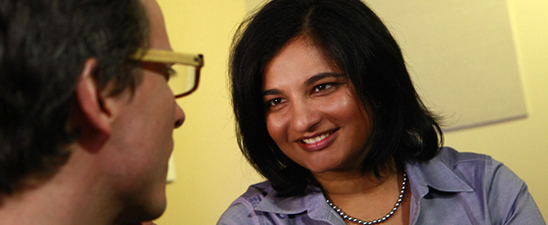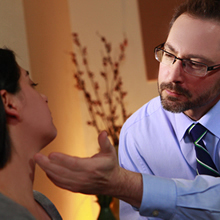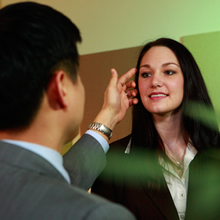Deciding to Get Cosmetic Surgery

Am I a candidate?
You might be seeking cosmetic services for a variety of reasons. Regardless of the reason, the decision to undergo plastic surgery or cosmetic procedures is a very personal decision that should be made between a patient and their provider.
Before seeing a provider it is important to determine your expectations. You can get started by asking yourself the following questions:
- What features am I dissatisfied with? Why?
- What are my expectations/goals for the outcome of the procedure?
- Will my schedule allow for the necessary recovery? Who will take care of me if needed?
Asking yourself these important questions will help your provider determine if cosmetic surgery is right for you. The best results happen when your expectations are realistic.
Not everyone is a good candidate for surgery. Patients who excessively smoke or drink, have serious health problems (obesity, diabetes, heart or lung disease, poorly managed mental health concerns), or are unwilling to follow doctors’ orders can increase their risk of complications and poor aesthetic outcomes.
All of this will be discussed at your consultation. To schedule a consultation with one of our experts, contact us.
During your consultation

Prior to your consultation, you will receive a new patient packet in the mail. The packet will include a new patient questionnaire, directions and any other pertinent financial information.
Please plan to arrive 15 minutes prior to your consultation along with your completed questionnaire and consultation fees.
During your consultation, you and your provider will talk about your areas of concerns and what procedures you are considering. Your discussion will also include any medications, allergies, surgical history and medical conditions you may have.
After a brief examination, your provider will share your surgical or cosmetic options, expected results, and the alternatives and associated risks. Part of the consultation may also include photographs and tape measurements to be used as part of the treatment planning process. You will have the opportunity to ask any additional questions. Below are additional important questions you should consider asking:
- How many years of training have you had?
- How can I help achieve the best results?
- How long of a recovery period can I expect, and what kind of help will I need during my recovery?
- How are complications handled?
Following your examination, you will be given a fee estimate that discusses the associated costs of the proposed procedure(s). OHSU policy requires that all fees be paid prior to procedures taking place; individual clinics may have varying timelines for when fees are due.
Preparing for surgery
Once you have been scheduled for your procedure(s), you will need to visit your provider’s office for a pre-operative appointment. During this visit your provider will:
- Answer any questions about the procedure(s)
- Perform a history and physical examination
- Order any appropriate preoperative lab work, EKG, radiology exams, etc.
- Collect any outstanding fees according to your fee estimate
- Unless otherwise directed by your physician, do not take any Aspirin, Vitamin E, non-steroidal anti-inflammatory (i.e. Advil, Aleve, Ibuprofen), or herbal supplements for TWO weeks prior to your surgery, as this interferes with normal blood clotting. If you need a pain medication for general purposes, use Tylenol. If you are in doubt about any medications that you are taking, please contact our office.
You should not smoke two weeks prior and two weeks after the procedure. If you are a smoker, please notify your provider. Smoking can significantly affect the outcome of your procedure. Please be aware that long-term effects of smoking cause a narrowing of the small arterial blood vessels that traverse the skin. This decreases the circulation of the tissues of the skin and makes it necessary for the surgeon to be more conservative in any plastic surgery. Smoking near the time of surgery causes a further acute narrowing of the blood vessels, which may cause ischemia of the tissue, poor healing, bad scars, or actual loss of tissue.
Finally, report any signs of a cold, fever, cough, infection or skin lesion to your provider prior to surgery.
Day of surgery

You will need to check in two hours prior to your scheduled surgery time. Please be sure to arrange for someone to pick you up after your procedure, as you still may be somewhat affected by the anesthesia. We will not, under any circumstances, allow you to drive yourself home.
Do not eat or drink anything, including water, after midnight the night before your surgery. Wear comfortable clothes that button down the front. Leave your valuables at home and please do not wear jewelry. If you are having surgery on the face, please refrain from wearing any makeup.
Anesthesia options:
- Local - an injection in the affected area to provide anesthesia
- Regional - an injection to provide anesthesia of a larger area such as your arm or leg
- Twilight - a combination of intravenous sedation and local anesthetics provides relaxation and reduced memory of the procedure.
- General - Intravenous sedation is used to allow patient to gently drift off to sleep are combined with anesthetic gases; may or may not include a breathing tube.
The type of anesthesia used for a surgery usually depends on the procedure performed. Talk with your surgeon about the type that is right for you.
Patients are encouraged to have someone stay with them the night after surgery. Patients who are from out of town are also encouraged to stay in the Portland area the night of surgery. Those from out of state may choose to remain in Portland for a few days after surgery, depending upon the procedure performed and when post-operative visits are required. Visit our lodging page for a list of local hotels.
Recovery
Most of our procedures are in office or outpatient. During your preoperative visit, your provider will discuss any limitations or activity restrictions associated with your planned procedure. Following the instructions provided to you is critical to helping ensure the best possible outcome for your procedure. The day of surgery, please take it easy at home (due to the anesthesia). For several weeks, you will want to protect the incisions from excessive lifting, pushing and motion.
Regardless of the type of procedure, you should be on the lookout for any signs of infection, which include high fever (greater than 101 degrees), redness, unexpected swelling/drainage, chills and general malaise. If you are experiencing these symptoms please contact your provider at the number below. For urgent after- hours help please contact an OHSU operator at 503 494-8311.
It is important that surgical incisions are not subjected to excessive force, swelling, abrasion, or motion during the time of healing. Personal and vocational activity must be restricted. Protective dressings and drains should not be removed unless instructed by your surgeon. Successful post-operative function depends on both surgery and subsequent care. Physical activity that increases your pulse or heart rate
may cause bruising, swelling, fluid accumulation and the need for return to surgery. It is wise to refrain from intimate physical activities after surgery until your physician states it is safe. It is important that you participate in follow-up care, return for aftercare, and promote your recovery after surgery.
Postoperative visits vary depending on the procedure performed, but typically patients are scheduled to be seen in clinic at: two weeks, one month, three months, six months and one year. The cost of these visits is included with the initial fees paid prior to the procedure. These visits are an essential part of the healing process. They give you the opportunity to discuss any concerns and help your provider track your recovery.
To help minimize scarring we also recommend the use of a broad-spectrum sunscreen (SPF 30 or greater) on all incisions sites.